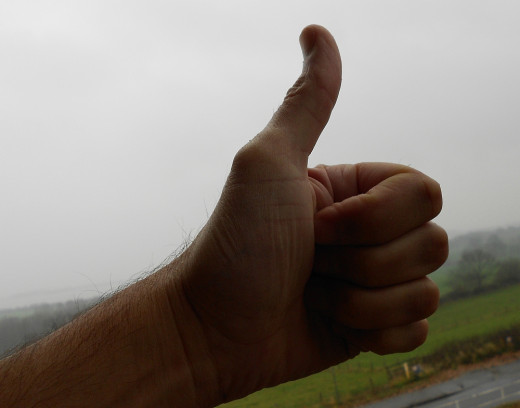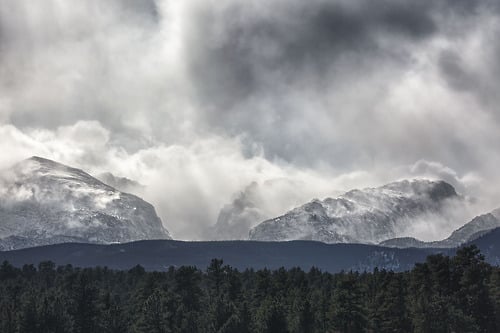Adventures of the Soul, Part Four: How Far Shall One Go?

One perspective
The traveling couple moved on to other callings and lessons from their hitchhiking in New Zealand. They gave rides as well as received them over the years. Looking back, the writer cannot imagine how dull existence would have been if he had not extended himself in trust. The stories recounted in this hitchhiking saga are some of the jeweled moments of his life.
This saga was inspired by a Hubpages question and all the answers which ensued, "Under what circumstance would you pick up a hitchhiker? Or, do you feel it is altogether too risky?"
The responses were equally divided, with half saying in effect they would and do - with common sense - readily pick up a hitchhiker. Half wrote, paraphrased, that they would like to help but were in fear and would not pick up a hitchhiker under any circumstance.
When the writer and his partner returned to America after a year in Spain, they found themselves on the road dragging all their luggage in a heavy downpour. In this instance, the writer caught sight of a parked car and approached it to ask for help. The driver instead rolled up his window and looked away.
The self-protective mechanism is understandable in our human species, yet what does it bring? A heart that is closed - both to our own truth and towards our fellow man?
What is the value of living in the vibration of a closed heart?
Is the measure of one's life just in the number of years?
The Lesson of Flight 90
Picking up a hitchhiker may not be the same as passing on a lifeline, but it could be a useful metaphor in a certain sense.
When Air Florida Flight 90 crashed into the 14th Street Bridge over the Potomac River on January 13, 1982 the survivors were rescued from the icy river by civilians and professionals.
Passenger Arland D. Williams Jr., barely afloat in the freezing water, caught the line but instead of wrapping it around himself passed it to another struggling person. On a return trip, the helicopter lowered two lifelines. Williams again caught one of the lines, and again passed it on. Before he could be rescued, he disappeared beneath the icy surface and drowned (story condensed from the Wikipedia article).
How moving it is when a person lays down their life for others. Giving a ride to a hitchhiker is not to be compared to passing a lifeline to a stranger and drowning, except in the sense of saying "I value you as a fellow human being and am willing to take a risk."
Colorado Mountain High
The writer, having made a short drive at night and just a few minutes from returning home, picked up a man hitching along the highway between Denver and Buena Vista, Colorado in a winter blizzard.

The man had left his troubled life in the mid-west and was starting over with a new job about 100 miles further into the mountains. He did not ask, but the writer decided to take him to his destination.
On the way back in the wee hours, climbing a steep grade, the van driven by the writer stalled and came to a stop. It would not crank. The writer had left everything out of the van with the idea of being back in the warmth of his house quickly, and the temperature was dropping fast.
He didn't even have a warm jacket as he was moving and the jacket was with clothing in the new location. The vehicle heater had been enough, until now. He had no cell phone and had not seen another car for the past two hours.
He was starting to think about writing his obituary when headlights appeared ahead. Flagging down the reluctant woman, he explained his situation through the heavy snowfall and the crack in her window. She said she would call the highway patrol. About an hour later, a disgusted patrolman pulled up in a jeep. He radioed for a tow truck. The bill for towing was $150.
If he had turned his head away from the hitchhiker, the writer would have slept warm in his bed that night. But as he reflected on it, he determined that he would not allow the experience to deter him from extending himself even at a risk, to follow his feeling to help his fellow man. According to his perspective, the borders between us are illusionary. When guided by true intuition, which always leads to serving Life, helping another is helping oneself.
Adventures of the Soul
Part One tells of the writer's return to America from Spain with his partner and their hitchhiking to northern Georgia. In the wee hours of the morning, four Georgia sheriffs relayed the couple across county lines to their destination.
Part Two tells the beginning of the writer's odyssey in New Zealand with his partner as people stop spontaneously to give the couple rides from Auckland to Wellington and receive gifts of insight and a poem.
Part Three continues the writer's journey in New Zealand with his partner as they are given remarkable rides to Christchurch and Queenstown, with marvelously magic moments and life lessons on the way.
Part Four concludes the hitchhiking saga with the story of a ride given to a man who had left his troubled life for a new beginning. The writer gave the hundred mile ride in a mountain snowstorm and lived to reflect on it.









